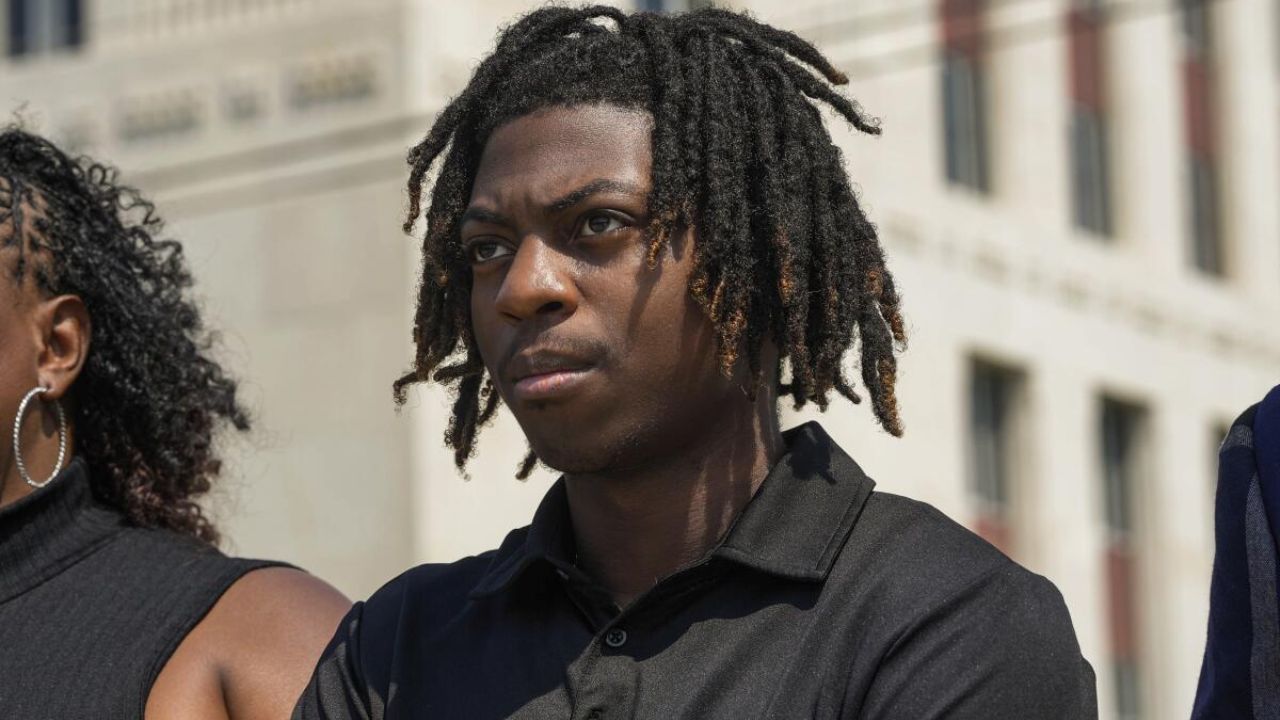Fate Of Lawsuit Filed By Black Texas Student Punished Over Hairstyle
After hearing arguments regarding whether to dismiss a lawsuit brought by a Black high school student who claims he was subjected to gender and racial discrimination during his months-long expulsion from his Texas school district for refusing to alter his hairstyle, a federal judge decided not to rule right away on Thursday.

Darryl George, 18, has not attended his usual high school classes in the Houston region since August 31 due to the Barbers Hill district’s claim that his hair length is inappropriate.
The district claims that George’s long hair, which he wears tied and coiled in locs atop his head, is against school regulation because, if it were allowed to fall, it would cover his eyebrows, earlobes, and shirt collar. According to the district, other pupils with locs adhere to the length policy.
In response to his punishment, Darryl George and his mother Darresha George filed a federal civil rights complaint against the Texas governor, Attorney General Ken Paxton, the school system, the superintendent, and the principal and deputy principal.
The case claims that by continuing to punish George for his haircut, the defendants have participated in or failed to stop racial and gender discrimination against him.
“I’m just happy that we’re here. We finally made it here. This is another stepping stone we have to cross. It’s been a long road and we will just be in this fight,” Darresha George said after Thursday’s court hearing.
The lawsuit claims that George’s punishment also contravenes the CROWN Act, a recently enacted state law that forbids discrimination against people based on their hair colour. The CROWN Act, which went into effect in September, forbids employers and educational institutions from punishing individuals for their hair colour or protective hairstyles such as Afros, braids, locs, twists, or Bantu knots.
In addition, the lawsuit claims that George’s First Amendment rights to free speech and expression are being violated. George, a junior, has spent the majority of the academic year in either an off-site disciplinary program or in-school suspension at Barbers Hill High School in Mont Belvieu.
George’s lawyer, Allie Booker, informed U.S. District Judge Jeffrey Brown on Thursday that the district’s policy is racially biased and discriminatory. Booker claimed that although the school system granted religious exemptions regarding hair length, it did not abide by the CROWN Act as it did not provide safeguards based on race.
Booker further contended that the school system lacked explicit policies outlining why girls were permitted to have long hair while boys were not.
Brown enquired as to whether there was any case law supporting the First Amendment’s protection of hair length as expressive conduct. Booker stated that while she had not discovered any, George’s action is a precedent-setting case and that a person’s right to self-expression through their hairstyle does not necessarily have to be closely linked to their religious beliefs to be protected by the law.
“It’s not about the length of hair, it’s about acceptance for all in the same manner,” Booker said after the court hearing.
The Barbers Hill school district’s lawyer, Jonathan Brush, informed Brown on multiple occasions that the district has a policy that is neutral toward race and that George’s lawsuit did not demonstrate a strong enough pattern of racial discrimination by the district.
According to Brush, the district’s hair length regulation would “pass muster” in the military and the workplace, and having varied rules on hair length for boys and females “does not constitute discrimination.”
Additionally, Brush stated that because the kid did not demonstrate how “his hairstyle communicates a message to the world,” George’s First Amendment rights were not being violated.
According to Darresha George, her son places cultural and religious significance on his haircut. According to historians, many African Americans associate braids and other hairstyles with cultural importance.
According to Brown, he was leaning toward dropping the lawsuits against Abbott and Paxton as well as some of the accusations made against the superintendent and other school officials. He promised that a final decision would be made later.
The school system filed a lawsuit, and in February, a state judge said that the sentence it received did not violate the CROWN Act.
Two more teenagers filed a federal complaint in May 2020 over Barbers Hill’s hair policy. After a federal judge granted a temporary injunction, one of the two students returned to the high school, citing “a substantial likelihood” that his rights to free speech and to be free from racial discrimination would be violated if he was denied access. The case is still open.
George declined to speak after Thursday’s hearing. Booker said “Darryl’s a little sad” because he’s had difficulty finding a job for the summer.
“He’s just afraid that some of the people that don’t agree with this case will hold it against him as they have been,” Booker said.


Comments are closed.